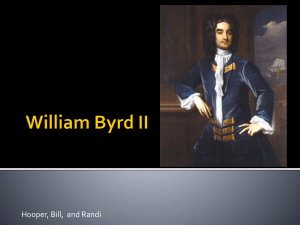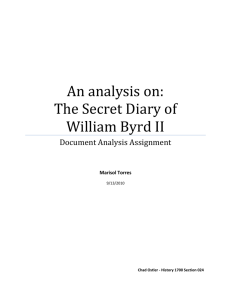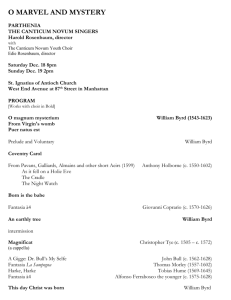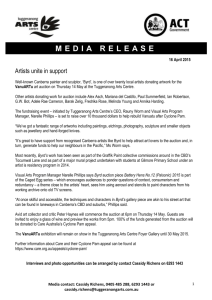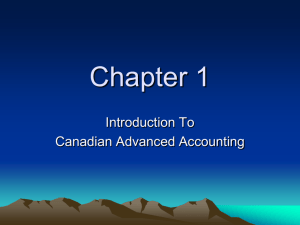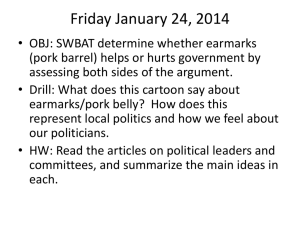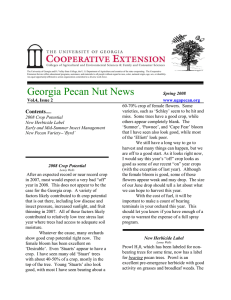script as PDF.
advertisement
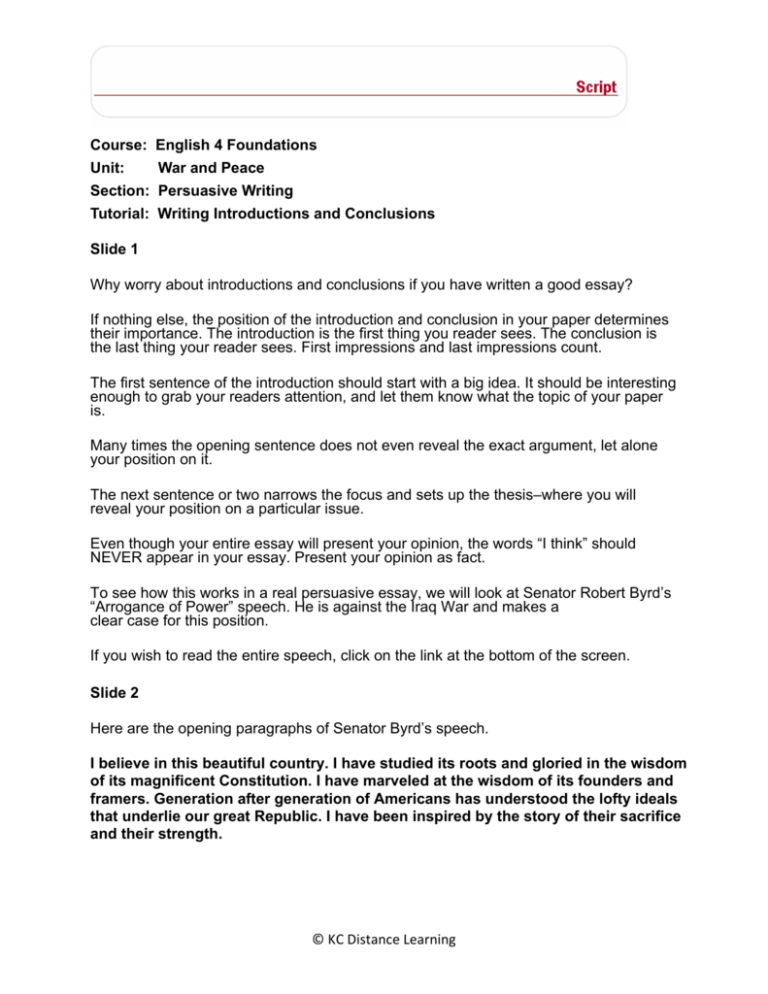
Course: English 4 Foundations Unit: War and Peace Section: Persuasive Writing Tutorial: Writing Introductions and Conclusions Slide 1 Why worry about introductions and conclusions if you have written a good essay? If nothing else, the position of the introduction and conclusion in your paper determines their importance. The introduction is the first thing you reader sees. The conclusion is the last thing your reader sees. First impressions and last impressions count. The first sentence of the introduction should start with a big idea. It should be interesting enough to grab your readers attention, and let them know what the topic of your paper is. Many times the opening sentence does not even reveal the exact argument, let alone your position on it. The next sentence or two narrows the focus and sets up the thesis–where you will reveal your position on a particular issue. Even though your entire essay will present your opinion, the words “I think” should NEVER appear in your essay. Present your opinion as fact. To see how this works in a real persuasive essay, we will look at Senator Robert Byrd’s “Arrogance of Power” speech. He is against the Iraq War and makes a clear case for this position. If you wish to read the entire speech, click on the link at the bottom of the screen. Slide 2 Here are the opening paragraphs of Senator Byrd’s speech. I believe in this beautiful country. I have studied its roots and gloried in the wisdom of its magnificent Constitution. I have marveled at the wisdom of its founders and framers. Generation after generation of Americans has understood the lofty ideals that underlie our great Republic. I have been inspired by the story of their sacrifice and their strength. © KC Distance Learning But, today I weep for my country. I have watched the events of recent months with a heavy, heavy heart. No more is the image of America one of strong, yet benevolent peacekeeper. The image of America has changed. Around the globe, our friends mistrust us, our word is disputed, our intentions are questioned. Notice how Senator Byrd starts with a big idea – the wisdom of the Constitution and our country’s ideals. He establishes his credentials as a patriot. In the second paragraph of his introduction, he narrows his focus. He says, “Today I weep for my country” and explains why. “The image of America has changed,” he says. Then he states his thesis: He states: “Around the globe, our friends mistrust us, our word is disputed, our intentions are questioned.” Notice that he does not say, “I THINK our friends mistrust us.” He states as fact that they DO mistrust us. Slide 3 Make your final impressions count, too. The conclusion should be almost the reverse of the introduction. The first sentence of the conclusion should start with a big idea. You can restate your position or you can do something else important, as Senator Byrd did, to make a transition. In the second sentence of your conclusion, widen the focus. Set readers up for the last sentence. The last sentence should end with a big idea. It’s your last chance to give readers something to think about. Finish strong! On the next screen, we will look at the conclusion of Senator Byrd’s “Arrogance of Power” speech. Slide 4 Here is the concluding paragraph of Senator Byrd’s speech. When people read your conclusion, they should have an immediate feeling that the essay is coming to an end. Start your conclusion with a big idea. Senator Byrd’s conclusion admits that his side is probably not going to win the debate about the war. He uses this big idea as a transition. Then he widens his focus. © KC Distance Learning Byrd says that “Perhaps Saddam will yet turn tail and run. Perhaps reason will somehow still prevail.” However, you get the feeling that he does not think either will happen. After a traditional blessing that many politicians give, he returns to his thesis statement. His hope for the future is what he uses as his final statement: He states, “May we somehow recapture the vision which for the present eludes us.” The vision, of course, is what he described in his opening paragraph, a vision of “the lofty ideals that underlie our great Republic.” Slide 5 Keep Senator Byrd’s introduction and conclusion in mind when you write your own introduction and conclusion. Many writers suggest that you write your introduction and conclusion last. That way, you will know exactly what your position and thesis statement are. And all sorts of good ideas have been running through your head by then. © KC Distance Learning Robert C. Byrd The Arrogance of Power delivered on 19 March 2003, Senate Floor I believe in this beautiful country. I have studied its roots and gloried in the wisdom of its magnificent Constitution. I have marveled at the wisdom of its founders and framers. Generation after generation of Americans has understood the lofty ideals that underlie our great Republic. I have been inspired by the story of their sacrifice and their strength. But, today I weep for my country. I have watched the events of recent months with a heavy, heavy heart. No more is the image of America one of strong, yet benevolent peacekeeper. The image of America has changed. Around the globe, our friends mistrust us, our word is disputed, our intentions are questioned. Instead of reasoning with those with whom we disagree, we demand obedience or threaten recrimination. Instead of isolating Saddam Hussein, we seem to have isolated ourselves. We proclaim a new doctrine of preemption which is understood by few and feared by many. We say that the United States has the right to turn its firepower on any corner of the globe which might be suspect in the war on terrorism. We assert that right without the sanction of any international body. As a result, the world has become a much more dangerous place. We flaunt our superpower status with arrogance. We treat UN Security Council members like ingrates who offend our princely dignity by lifting their heads from the carpet. Valuable alliances are split. After war has ended, the United States will have to rebuild much more than the country of Iraq. We will have to rebuild America's image around the globe. The case this Administration tries to make to justify its fixation with war is tainted by charges of falsified documents and circumstantial evidence. We cannot convince the world of the necessity of this war for one simple reason. This is a war of choice. There is no credible information to connect Saddam Hussein to 9/11. The twin towers fell because a world-wide terrorist group, Al Qaeda, with cells in over 60 nations, struck at our wealth and our influence by turning our own planes into missiles, one of which would likely have slammed into the dome of this beautiful Capitol except for the brave sacrifice of the passengers on board. The brutality seen on September 11th and in other terrorist attacks we have witnessed around the globe are the violent and desperate efforts by extremists to stop the daily encroachment of western values upon their cultures. That is what we fight. It is a force not confined to borders. It is a shadowy entity with many faces, many names, and many addresses. But, this Administration has directed all of the anger, fear, and grief which emerged from the ashes of the twin towers and the twisted metal of the Pentagon towards a tangible villain, one we can see and hate and attack. And villain he is. But, he is the wrong villain. And this is the wrong war. If we attack Saddam Hussein, we will probably drive him from power. But, the zeal of our friends to assist our global war on terrorism may have already taken flight. The general unease surrounding this war is not just due to "orange alert." There is a pervasive sense of rush and risk and too many questions unanswered. How long will we be in Iraq? What will be the cost? What is the ultimate mission? How great is the danger at home? A pall has fallen over the Senate Chamber. We avoid our solemn duty to debate the one topic on the minds of all Americans, even while scores of thousands of our sons and daughters faithfully do their duty in Iraq. What is happening to this country? When did we become a nation which ignores and berates our friends? When did we decide to risk undermining international order by adopting a radical and doctrinaire approach to using our awesome military might? How can we abandon diplomatic efforts when the turmoil in the world cries out for diplomacy? Why can this President not seem to see that America's true power lies not in its will to intimidate, but in its ability to inspire? War appears inevitable. But, I continue to hope that the cloud will lift. Perhaps Saddam will yet turn tail and run. Perhaps reason will somehow still prevail. I along with millions of Americans will pray for the safety of our troops, for the innocent civilians in Iraq, and for the security of our homeland. May God continue to bless the United States of America in the troubled days ahead, and may we somehow recapture the vision which for the present eludes us.

